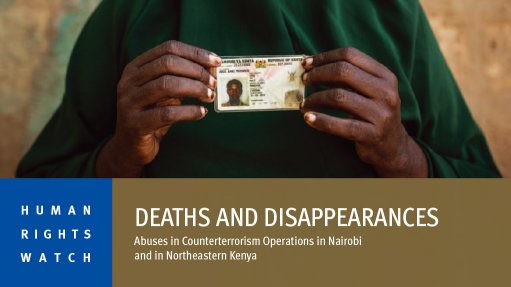
On June 29, 2015, three men went to the home of 45-year-old Farah Ibrahim Korio, an ethnic Somali Kenyan and teacher of Islamic education in Wajir, northeastern Kenya. When they did not find him, they threatened to arrest his wife and five children if they did not disclose his whereabouts. The men had no uniforms that could have identified them as police men, neither did they reveal their identity nor divulge why they were looking for Farah. They then arrested and whisked away the shopkeeper at a nearby shop, mistaking him for Farah, but dumped him on the road miles away when they realised their error. The men later directed the area chief to find Farah for them.
When Farah learned that some unknown people were looking for him, he reported the matter at the Wajir police station. When his family approached Wajir county police commander on his whereabouts, he said he did not have any categorical information about who was looking for Farah, as there were many officers from different Kenyan security agencies in Wajir, many of whom were not under his command, including the police’s anti-terrorism unit (ATPU), military intelligence and administration police.
Farah agreed to meet the area chief at Wajir police station the next day and shortly after arriving, and within minutes of the area chief’s arrival at the station, the same three men drove into the police compound, according to witnesses. A uniformed police officer told some of Farah’s family members that the three men were military intelligence officers. The family briefly went to pray just outside the police station as the officers talked to Farah. That was the last time Farah’s family saw him.
Back at the police station, the police informed them that the three officers had taken Farah to the ATPU offices nearby. The ATPU denied to the family having seen him and suggested that he might be in Wajir military camp.
Farah’s family has been searching for him for over a year. He is one of at least 34 people, including two women, according to Human Rights Watch research, taken into custody by security forces during counterterrorism operations in northeastern Kenya between 2013 and 2015, whose whereabouts remain unknown. Families of those missing have searched detention facilities far and wide, sought help from political and religious leaders, complained to the state-funded Kenya National Commission on Human Rights and in some cases, boldly taken to social media in attempts to locate their loved ones. Kenya authorities have denied knowledge of the missing people, failed to acknowledge credible evidence of abuses during counterterrorism operations, failed to investigate the allegations and in some instances, intimidate and harass those seeking information and accountability.
Report by the Human Rights Watch